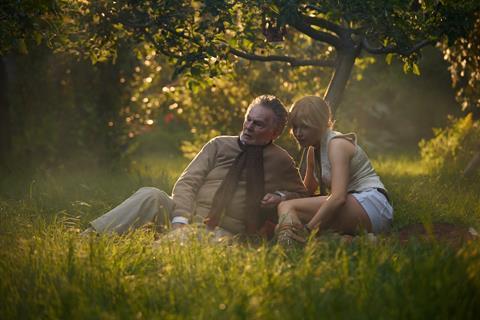Derek Jacobi and Ellie Bamber star as the artist and model in James Lucas’s lacklustre drama

Dir. James Lucas. UK/New Zealand. 2025. 100mins
Two demi-mondes meet in Moss & Freud: the turn-of-millennium club-glam scene of model Kate Moss, and the older artistic London embodied by revered painter Lucian Freud. Their point of conjuncture was Freud’s nude rendition of Moss, Naked Portrait 2002, for which James Lucas’s feature, which premieres in the BFI London Film Festival, could be considered a fictionalised making-of. But the film registers as more two-dimensional than the canvas.
More two-dimensional than the canvas
A fond, somewhat cosy evocation of an unlikely collaboration turned emotional kinship, it is oddly nostalgic in its glamourised if rueful depiction of a very recent era, ultimately coming across as a handsomely mounted but mundane celebrity anecdote. Playing opposite a somewhat below-par Derek Jacobi, Ellie Bamber gives matters an enthusiastic boost as a young, mercurial Moss – but not quite enough to give this slight number more than superficial celeb-saga appeal.
James Lucas, previously known as writer on 2013 Oscar-winning short The Phone Call, makes an uneasy feature directing debut here, his script especially awkward when trying to articulate Moss’s soul-searching. As a director, though, he does give ostensibly unpromising chamber-drama material a confident varnish of metropolitan swagger, and he works well with Bamber to extract nuance from what might otherwise have been a wafer-thin falling-angel role.
Bamber’s Moss is first seen in her 90s heyday, ecstatically, erratically speeding along in her sports car. She’s soon seen thrill-seeking in Berlin, but even she can’t get into an exclusive nightclub – presumably the notoriously bleeding-edge Berghain – because it’s S&M night. She resolves this by striding in half-naked with her chauffeur in his undies as her ‘pet’ (given that he’s black, an unfortunate lapse into casual racism on the film’s part).
Increasingly world-weary, Moss agrees to be painted by Freud (Jacobi), father of her fashionista friend Bella (a lively, louchely patrician Jasmin Blackborow). She hasn’t quite reckoned with how rigorous Lucian’s work routine is – or with his imperious bad temper. But she soon realises that the sittings in his studio are her royal road to self-discovery and decides to pose nude, declaring, “I don’t want to hide any more.”
A testy Freud similarly starts to reveal more of himself, not least when the pair bond in an opium session – with Jacobi’s accent disconcertingly shifting from Kensington posh to a powerful streak of German guttural (the painter was born in Berlin). Black-and-white flashbacks recall Freud’s youthful courtship of his second wife, aristo and writer Caroline Blackwood. Meanwhile an interview for Dazed and Confused becomes an extended flirting session with smoothie editor Jefferson Hack (Will Tudor).
Jefferson asks Moss whether she sees herself as an artist or a muse (“Good question,” she replies. “Both really”) – and the film, for which Moss serves as executive producer, very insistently coaxes us into accepting the artist argument. The slowly developing canvas becomes the battleground for two intense – and intensely self-focused – souls, the painted result presented as a co-authored record of their emotional combat. As a variant on art history’s entrenched tortured-genius-meets-naked-lady mythology, Moss & Freud is somewhat different in that here the model is manifestly more tortured than the painter. But as a serious contemplation on the thorny question of model-artist dynamics, the film is nothing on Jacques Rivette’s 1991 in-depth study La Belle Noiseuse.
Bamber perhaps overstresses the self-conscious jaded of Moss as too-much-too-soon megastar, but her performance comes into her own once her maturing Kate lets the doubts and vulnerabilities show, along with a sharper streak of self-aware humour. Jacobi, however, falls somewhat short of his storied best in his depiction of Freud as a dog-eared grandee with added angst. His performance inescapably raises memories of his more whole-heartedly incisive performance as Freud’s contemporary Francis Bacon in John Maybury’s 1998 Love Is the Devil – a film that revelled in its demi-monde roughness, where this one never transcends gossip and gloss.
Production companies: GFC Film, Lipsync
International sales: Embankment Films info@embankmentfilms.com
Producers: Matthew Metcalfe, Norman Merry, Maile Daugherty
Cinematography: Maria Ines Manchego
Production design: Ross McGarva
Editor: Nick Carew
Music: Karl Sölve Steven
Main cast: Ellie Bamber, Derek Jacobi, Will Tudor, Jasmin Blackborow
























